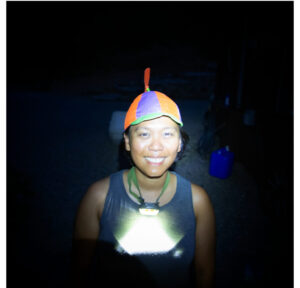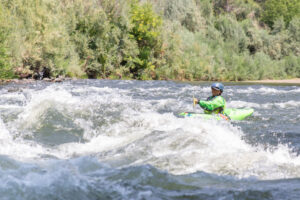Phone: 303.945.2490 Fax: 866.592.6911 Email: [email protected]
621 Kalamath St. Ste 175, Denver, CO 80204
Save the date and help us celebrate Out Living It Day on Saturday, July 27! Join a community adventure in your hometown and consider making a small donation to help us raise $25k to fuel adventure for others.
JOIN US FOR A 2024 HEALING ADVENTURE!
October is National Breast Cancer Awareness Month, and First Descents wants to honor those in our community who have been diagnosed with this disease, which affects one out of every eight women and one out of every 833 men. We asked four of our program alumni to talk about their journeys, and we’ll be sharing their stories, advice and post-cancer thoughts with you throughout the month.
This week we chatted with Frances Rocamora, who participated in our kayaking program on the Rogue River in Oregon in August of 2023. Frances, whose FD nickname is “Lionheart,” was born and raised in the Philippines, but she lived in Singapore while getting a PhD in molecular genetics and cell biology before moving to La Jolla, California, where she is a scientist at the University of California, San Diego, focusing on small molecule and protein-based drug discoveries.

Frances says she found First Descents through a Reddit AYA Discord community, where other members were chatting up their experiences on FD programs, and it inspired her to apply for the Rogue River trip. “First Descents did such a world of good for my mental health,” Frances says. “Nothing is more important than having someone say, ‘I see you, and I validate your experience and your feelings.’”
I was diagnosed in October 2021. Starting at the end of October 2020, I was feeling these pinpricks of pain, closer to where my heart would be on the left side, and it was so mild and intermittent, that I just didn’t think anything of it. Then by July of 2021, I turned 35 then, I realized those pinpricks were happening once a day at that point. So I started feeling around that area, and I realized there was a patch that was harder than when compared to the right side.
It was so faint, though, that I still didn’t process that it might be something serious. So I scheduled an appointment with my PCP in August, who said, yeah, it doesn’t seem like it’s anything, so let’s wait eight weeks and take a look again then. I had zero history in my family, and so again, thought nothing of it. I thought I just maybe had really dense breasts.
Well, eight weeks later, it was still there, and so on a Saturday morning, I went to this cancer clinic for a mammogram and ultrasound. Of course, it was a cancer clinic, and you would think that would tell me something, and also, it didn’t occur to me that there was only one receptionist, one radiologist, no one else there in the waiting room, the place was just dark and empty. It turns out that my doctor had conveyed that she was worried, and so they had come in just for me.
Even before the ultrasound was done, the radiologist came into the room and told me it was very likely breast cancer. I stood up right there. I was just in complete shock, and I didn’t even put on a shirt. It was like an out-of-body experience. But being very clinical, as a scientist, I tend to be logical first, so I just wasn’t feeling anything. Not even 48 hours later, I had a biopsy, and was diagnosed with breast cancer: Stage 2b, Her2+, Grade 2.
I spent most of the weekend crying, mourning my hair and just grieving. It’s like death a little, getting a diagnosis like that. There’s a great deal of grief that comes with it, and you just have to do the grieving.
Her2+ used to be the deadliest breast cancer, but now it’s the most treatable, even though it’s still incredibly serious. It reacts so well to treatment. I did six rounds of double chemo, 18 rounds of double immunotherapy, 36 rounds of radiation, a lumpectomy with a LICAP flap reconstruction, and finished all of my active treatments in December of 2022. This past May 3, I’ll have been NED (No Evidence of Disease) for 16 months.
Later, several doctors told me that if it hadn’t been so close to nerves, which is what was causing that pinprick pain, I may not have found it until it was much, much worse.

First, feel all the feelings. Everyone’s cancer experience is so unique, so there is not one set course. There are so many narratives. I had to process the grief that came with the diagnosis, and mentally review all the worst-case scenario projections. Emotional energy exhausts me, so my brain went into problem-solving mode. But you have to realize that all of those worries, like is this normal or is it normal to feel this way – it’s your body and your experience, so your response is absolutely appropriate. In every case. And if people want to celebrate or do this or that, and you don’t feel like it, honor those feelings. Don’t do anything you don’t want to do.
Two things. One, the logistics of it. I like talking to people who are newly diagnosed, because I wish someone had given me the primer or the life hacks before chemo. Arm yourself with as much data and info as you can, know what treatments to expect, what side effects there can be, how to mitigate the side effects. It will make your experience easier. It gave me back a sense of control. Being an active participant in my treatment made it more manageable for me.
Second, seek out your people. Find a community that welcomes you. This is especially important post-cancer. For me, the easiest was treatment, because it’s structured. But after chemo, that’s when the darkness comes. At the end of it, you’re just left with complete emptiness and darkness. You feel like everyone expects you to be normal again, but you don’t feel normal.
So it was important to me to find people who went through the same thing, I literally now have in real life all these “cancer friends” who I met through all these online communities and First Descents.
I think the biggest life change I’ve made is trying to be more deliberate and mindful about eating. I was always healthy, I considered myself a master swimmer who swims regularly, and while I was never obsessive about eating healthy and I’m still not, I did make a commitment to have more purposeful awareness of what I’m consuming. So, I cut out processed foods and I try to really look for foods that are good for me but also enjoyable to eat.
I also realized how much before cancer, I was always anxious and stressed. I function very well under stressful conditions, but now that I look back, some of it was manufactured, in the sense that I didn’t have to be so hard on myself.
Being female, Asian, high-achieving, people-pleasing, highly empathetic, I was so used to not putting myself first and doing well at all costs. But now after breast cancer, I realize how unnecessary it all is. Before cancer I used to work almost all weekend, and a 60-hour week was a short week for me. After cancer, everything kind of falls away.
I say now that everything gets graded on the cancer curve: Is it going to kill me? Is it life-threatening? Is anyone hurt or on fire? If it’s none of those things, it can probably wait.
Oh yes, I worked all the way through treatment, and while at the time that made sense to me, partly because of the way my job is structured, now I wish I hadn’t. I wish I had spent more time resting. And while working through it helped keep me sane and gave me a sense of normalcy so my brain wouldn’t spiral, I wish I hadn’t forced myself to just suffer through the side effects and the fatigue.
I remember coming into a doc appointment feeling like death warmed over. I was filling out the forms, and I must have looked so bad because the nurse and the doc were like, are you OK? And within minutes I was getting anti-nausea and saline drips, and if I had just said I feel really fatigued and sore when I first came in, I’d have felt so much better faster. I’ve learned to ask for help.
Every day on my First Descents trip, we talked about that. I tell everyone that my time with FD was a week for me to receive. It’s easier to ask for help from strangers, isn’t it? But it shouldn’t be.